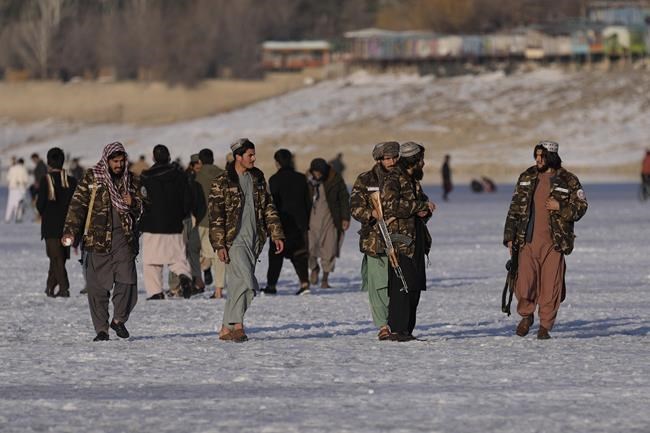KABUL, Afghanistan (AP) — The Taliban released two foreign journalists working with the U.N. refugee agency and several of the aid organization’s Afghan staff on Friday, UNHCR said, hours after news broke about their detentions in the capital, Kabul.
The announcement followed a tweet by the Taliban-appointed deputy minister of culture and information, Zabihullah Mujahid, who said they were detained because they didn't have documents that properly identified them as UNHCR. Mujahid said they were freed after their identities were confirmed.
“We are relieved to confirm the release in Kabul of the two journalists on assignment with UNHCR, and the Afghan nationals working with them,” the Geneva-based organization said in a brief two-sentence statement. “We are grateful to all who expressed concern and offered help. We remain committed to the people of Afghanistan.”
The development in Kabul comes as President Joe Biden signed an executive order that promised $3.5 billion — out of $7 billion of Afghanistan's assets frozen in the United States — would be given to families of America's 9/11 victims. The other $3.5 billion would be freed for Afghan aid. The order would allow U.S. financial institutions to facilitate access to the money by humanitarian groups, which would then give it directly to the Afghan people.
One of the detained foreign journalists was Andrew North, a former British Broadcasting Corporation journalist who has worked extensively in Afghanistan. His wife, Natalia Antelava had earlier issued a plea on Twitter for his release.
“Andrew was in Kabul working for the UNHCR @Refugees trying to help the people of Afghanistan,” Antelava said. “We are extremely concerned for his safety & call on anyone with influence to help secure his release.”
The Committee to Protect Journalist had also condemned the detentions and called for the immediate release of the journalists.
“The Taliban must immediately release Andrew North and all other journalists held for their work, and cease harassing and detaining members of the press,” the CPJ statement said, noting they were detained on Tuesday.
The Taliban swept over Afghanistan, capturing Kabul and much of the country in mid-August, as U.S. and NATO troops were in the final, chaotic weeks of their pullout following the 20-year intervention.
“The Taliban’s detention of two journalists on assignment with the U.N. refugee agency is a sad reflection of the overall decline of press freedom and increasing attacks on journalists under Taliban rule,” Steven Butler, CPJ’s Asia program coordinator, said in Washington.
Also released on Friday was Parvaneh Ibrahimkhel, a women's rights activist detained more than two weeks ago. She spoke to local TOLO TV to confirm that she was free but few other details were immediately available. The international community had also demanded her freedom, as well as that of four other women activists.
Since taking control, the Taliban have imposed widespread restrictions, many of them directed at women. Women have been banned from many jobs, outside the health and education field, their access to education has been restricted beyond sixth grade and they have been ordered to wear the Islamic headscarf, or hijab. The Taliban have, however, stopped short of imposing the burqa, which was compulsory when they previously ruled Afghanistan in the 1990s.
Universities for women have also begun to re-open and Taliban have promised girls would be allowed to resume their education beyond grade 6 after the Afghan New Year at the end of March.
In January, the Taliban stormed the Kabul home of activist Tamana Zaryabi Paryani who was among about 25 women who took part in an anti-Taliban protest a few days earlier against the hijab. It wasn't immediately clear whether Paryani was also being released, but there have been international demands for her freedom as well.
The international community has been wary of officially recognizing Afghanistan’s new rulers, concerned the Taliban would impose the same harsh rule as they did when they were in power the first time.
In the wake of the takeover, international funding was suspended and billions of dollars in Afghanistan's assets abroad, mostly in the U.S., were frozen and financial aid to the government was largely halted, pushing the Afghan economy further into a tailspin.
Kathy Gannon, The Associated Press

